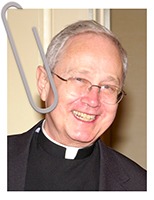In “Belong to God’ Father Pat Griffin of the Eastern Province raises a very question we each need to ask of ourselves. “What do we do and say which gives evidence of this truth of “belonging to God” as described for us in the Beatitudes?”
A Vincentian View: “Belonging to God”
All of us know what a seal is. In our day, it may take the form of a logo or insignia or symbol which is on a shirt or a scarf or a car or almost anything else. When we see that emblem, we know who made that object and who claims the credit for the design. A seal is like that; it marks something as belonging to a certain person or group. And so, for example, we have the seal of the Congregation or the Company which indicates who we are and to what we dedicate ourselves.
[This post originally appeared on FamVin.org.]
In the ancient world, a seal was often something which was burned or carved into an object to identify its owner. Or it might be pressed into hot wax to close and authorize a letter or contract. The seal would announce to whoever saw this object or letter that it belonged to somebody.
In the first reading from the Solemnity of All Saints, we have powerfully evocative imagery for the end time which is organized around a seal. Listen:
I, John, saw another angel come up from the East, holding the seal of the living God. He cried out in a loud voice to the four angels who were given power to damage the land and the sea, “Do not damage the land or the sea or the trees until we put the seal on the foreheads of the servants of our God.”
The image suggests God’s ownership and care for those who are his own. These people are the ones who have been faithful and they are marked with this seal. We can imagine what it says: “Belonging to the Lord God.” All those who had been faithful; all those who had lived their lives in keeping with the teachings of the beatitudes which we hear in the Gospel today are marked with this seal. They belong to God and no one else.
On the Solemnity of All Saints, we remember all those who have gone before us and lived their lives faithfully—those who strove, not always perfectly but with desire—to be good men and women who lived that intent to the end. We know people like this. We have had relatives and friends who made God the most important value in their lives and who wanted to advance God’s kingdom by their faithful living and actions. We should think of them as Saints and envision them in the presence of God. We can say that they lived their lives marked with the symbol of the one to whom they surrendered all: “Belonging to the Lord God.”
What about us? Are we sealed with the symbol of the Living God? Are our foreheads marked with the words: “Belonging to the Lord God.” When people see us, what will be the ways in which they will discern this sign? Perhaps, one of the ways is in our fidelity to living the Beatitudes as described by Jesus.
“Belonging to God” is the attitude captured in the Beatitudes which Jesus proclaims in the Gospel for All Saints. These promises give evidence of our being servants of our God and sealed with his Spirit:
Blessed are the poor in spirit,
for they belong to God.
Blessed are they who mourn,
for they belong to God.Blessed are the meek,
for they belong to God. . . .
What do we do and say which gives evidence of this truth of “belonging to God” as described for us in the Beatitudes? We can reflect upon this possibility as we think about those who have gone before us and are numbered among the saints of God. We pray that we might be so faithful as to join in their number. We ask for their intercession before our attentive God. In truth, God wants each of us to bear his seal, to belong to him, to demonstrate that truth by faithful living. We are all called to be holy, and the means is no secret. The Lord tells us how and strengthens us in our resolve.



Thanks,Father Pat….
Will keep trying to help others not to see too much of me but lots of God who lives within each one of us-including me..
Gratefully,
Ed Ambrose